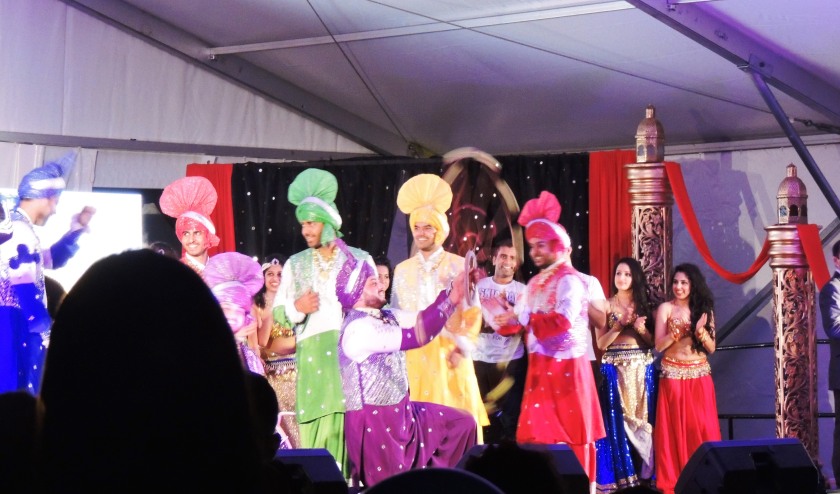It being India’s 70th Independence Day on the 15th August 2016, as usual we Australian-Indians took part in celebrations; enjoying the fairs and functions held in Australian cities prior to I-Day and continuing till after the great day.

(Fun…a part of Indian fairs and functions in Australia – Bhangara Dance from Punjab India)
Whether we live in India or outside, over the years we Indians have defined and redefined our attitude and patriotic sentiments attached to this special day, though our inner hearts remain the same. Migrating to a new land particularly evolves people’s journey, often confusing them about their identity, till they learn to open their hearts and minds. So it happened with me and on this day, I’m taken back in time.
As we migrated to Australia around two decades ago and I secured my first serious job in a government organization, I was pleased with this opportunity, while it was a personal growth to intermingle with lovely colleagues hailing from all races – an Anglican superintendent, Greek, Italian and Chinese workmates, and plenty of Indians too.
A new tense phase in so many ways but not at all a bad start.
(It’s a different matter that after almost two years, I discontinued this job. Call me a loser but as a new migrant my uptight patriotic heart couldn’t accept the job condition, that as a government employee I will have to give up my Indian citizenship.)
Even with this positive inauguration of my working life here, one day my colleague, another fresh migrant from India, made a comment, “Back then these people came to our country to rule us, and now we have come here to be ruled by them.”
This comment, though seemingly innocent, carried much more weight.
Personally speaking I didn’t feel as strongly as she did. That’s because any white people in my office or neighbourhood were genuinely nice and friendly. Rather I used to think, “How come they allow us to take up such responsible jobs. After all we are like foreigners.”
That time, it suited me to almost forget that India too always allowed foreigners in its territory, not only allowed foreigners to rule them in their own country but rule in a ruthless enslaving way; whereas here in Australia we are more or less workers, the economy boosters with not much scope for ruling as such. (It’s a different matter that most migrant Indians living outside India will not end up as rulers even if they were to live in their native country)
But…with all the good vibes within my workplace, one day when a white colleague asked me “Do you guys have TV in India?”, I had felt taken aback at what seemed like opinionated attitude. Possibly it was an innocent question but I felt like retorting “No, we only have cobras and snakes!”
Of course I didn’t say that to her. That doesn’t mean I never argued with anyone about India. In those early days, something used to go wrong with me any time I heard some offensive remark about my native land. As if somebody had touched the gashing raw nerve of my already uprooted patriotism.
Another fellow migrant from India told me, that in her office too, a woman colleague used to jibe at their Indian male colleague each day. As he heated his food for lunch and the aroma wafted around, she would make comments like: “Yikes! How can people eat curries every day!! I throw away Indian food given to me by my neighbour.”
That Indian man wasn’t even aware of her comments, but my friend, after simmering in perceived insult for days, retorted back to that woman, “How can people be really happy eating bland food every single day?”
The Indian lady shared this incident with me to lighten up her heart. But obviously, such retaliation from her side would not have changed that racist lady. She must have targeted many others.
Not just face-to-face, but say on talk-back radio where biased discussions (those days) were more overt, one could often hear some remarks by radio anchors and callers. That’s when I heard many Indians call the radio and react, so as to defend India and portray it positively. I too did that a few times though not exactly react but discuss. Nowadays I wonder, are these spontaneous reactions our true love for our birth country? Are they like rites of passage?
Then there is another set of feelings when Indian-Australians first get to know about Aborigine history. Most of them feel awful about the subjugation of native Aboriginals, and unthinkingly end up comparing it to the enslaving of Indians by the same colonialists. In the early years of our migration, this was often a topic of discussion within friends’ family gatherings. Before we migrated we were ignorant about Aborigine issues, and that was bliss…because, I feel, this half-knowledge gained later was also not totally unbiased.
Patriotism also used to reek aplenty when we felt too sentimental on each Independence Day listening to patriotic songs, but most early migrants particularly cannot help feeling so.
~~~
All in all, be it our reaction to racism, or general patriotic emotions, there is intensity about it as we arrive in a new country! In most cases, this is a passing phase. Obviously as a new migrant, we miss our native country -our home and family. Migration blues topped by culture shock on being surrounded by foreigners are not unusual (at least it was so twenty years ago when there was no social media to connect back home)
After this perplexing immature period, gradually our mind mellows and settles down. And that is when we open up and change, and consciously or unconsciously we reassess our love and our duties towards our birth country as well as the adopted land. Hence, Indians too change when they become a part of the new country, and as years go by, they’re still sentimental about their native country, but no more hyper-touchy in a reactive way, so to say. And also less weepy on hearing Bollywood patriotic songs, though still stirred.
This change in our reactions is not just about us. It is not just that our own perceptions about ethnicity/race issues gradually change and become positive. It is that India has changed for the better, and with that comes greater respect as the rest of the world opens up towards us.
It is also that now we Indians are aware that we are no less than others. If somebody is racist, we know better how to deal with it without retaliating or turning too inwards. Our previous unreasonable complexes due to years of slavery have been replaced by new confidence. The new-generation recent migrants from India, who grew up in a prosperous, digitalized and globalized India, particularly radiate with that self-confidence. They brought their positivity here to Australia that has now seeped into the earlier migrants too.
We now have a different kind of nationalism and patriotism, one that is not based on the cumulative hurt given to us by the British Empire, or on hatred for the atrocities committed by the colonialists. With our hard feelings melted, we are able to form better and healthier alliances that benefit us here as a community.
That does not mean we have forgotten the extreme hardships that were faced by the freedom fighters and revolutionaries in their long drawn out Independence Movements, due to which we could finally call our birth country our own. 
We still salute Bhagat Singh and thousands of martyrs who sacrificed their life or precious time to give us our current life. No Indian can forget about Jallianwala Bagh massacre where more than 1,000 people were killed when General Dyer ordered his troops to fire machine guns on Indian protesters. Then there is Bengal famine of 1943, which killed up to five million people. I’ve been to Andaman and Nicobar Islands and shuddered at the torture borne by freedom fighters captured in Cellular Jail/Prison.
It is these sacrifices made by freedom fighters that make this day so special. And ‘sacrifice’ was the special theme for India’s 70th Independence Day on 15th August 2016, as the Indian prime minister, Narendra Modi launched a programme named as “70 Saal Azadi-Zara Yaad Karo Kurbani” (70 years – Do Remember The Sacrifices)
On this occasion, while we remember the martyrs, and while we continue to learn lessons from our history as well as treasure the nation we got after immense struggles, our nationalism and feelings has evolved from sheer emotions to acknowledgement of problems. We look forward to carving a better India minus any casteism, gender-related crimes, cleanliness issues and other vices. These goals are a challenge for the resident Indians every single day, as also on this Independence Day.
For us Australian-Indians also, Independence Day is all of the above (because we do go back often and physically live there too)…but it is also about relishing our feelings of independence in belonging to two modern free worlds that allow intermingling of residents of both countries. It is about availing the best that is being offered to them by two democracies – a freedom of mind, body and spirit. The change in minds is when we overlook petty racial judgments and small issues, for they have no place in our hearts anymore.
~~~
For Non-Resident Indians, often the challenge and confusion is how to maintain a balanced approach, a vision of a global citizen but at the same time being aware, that even when our other identities are lost, our inherited culture and native background will continue to be our true treasure. India is our heritage.
This pride in India is what we need to pass on to the next generations growing here in Australia – tell them how to be a right amount of Indian while doing their duty to wherever we happen to live; also how to have a right attitude as they grow up in such a multicultural environment. Make this process less complicated for younger generation Indians to let them belong to a free world!
Generally, if migrant Non-Resident Indians (of all age groups) live a progressive and respectable life, they add to the beauty and respect of their native country. Likewise, if India shines, it adds to the lustre of every Indian anywhere in the world.
What are your views on this topic and also on this particular post? Whether you agree or disagree, please do share your thoughts via your valuable comments.
You can also share my post on your favorite social media. Thanks!
